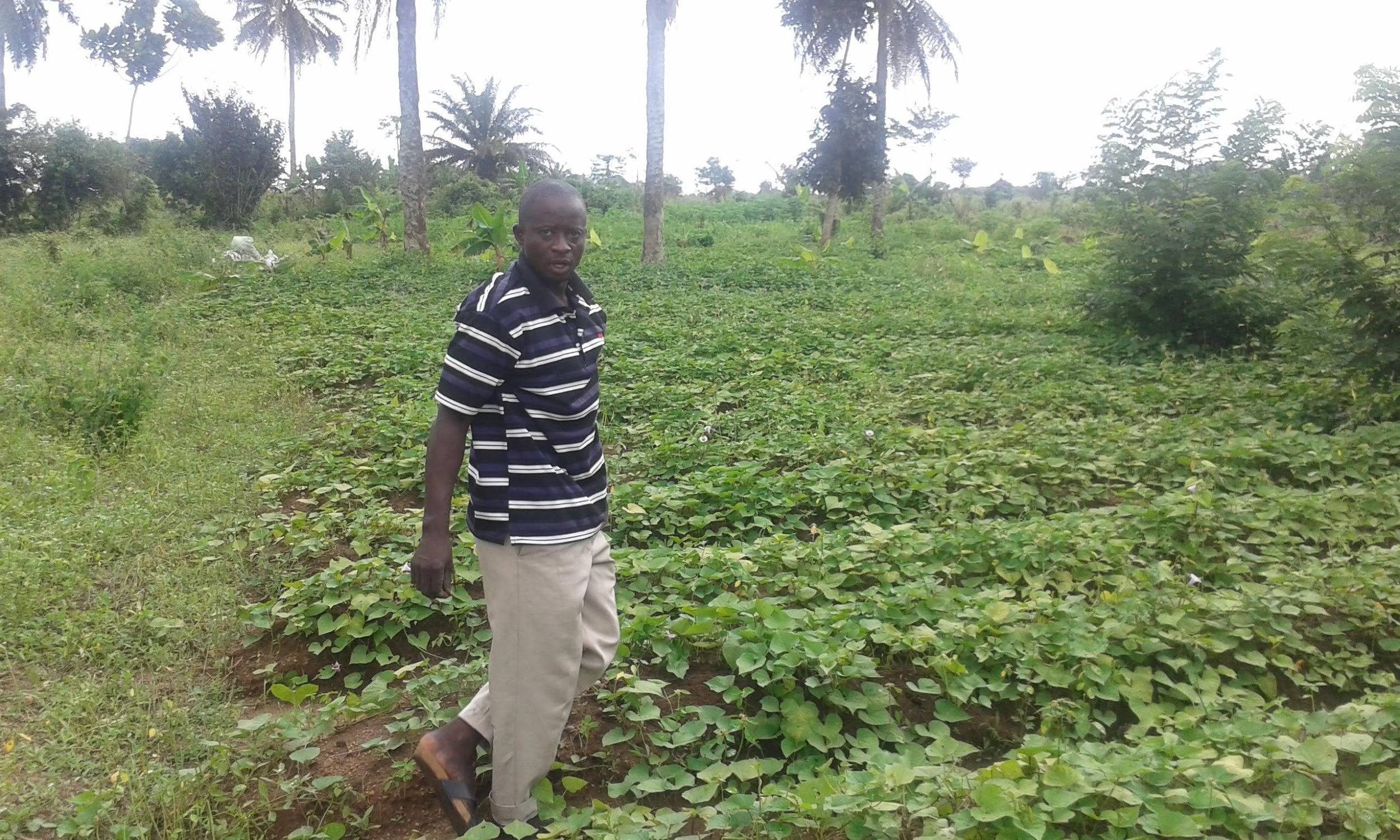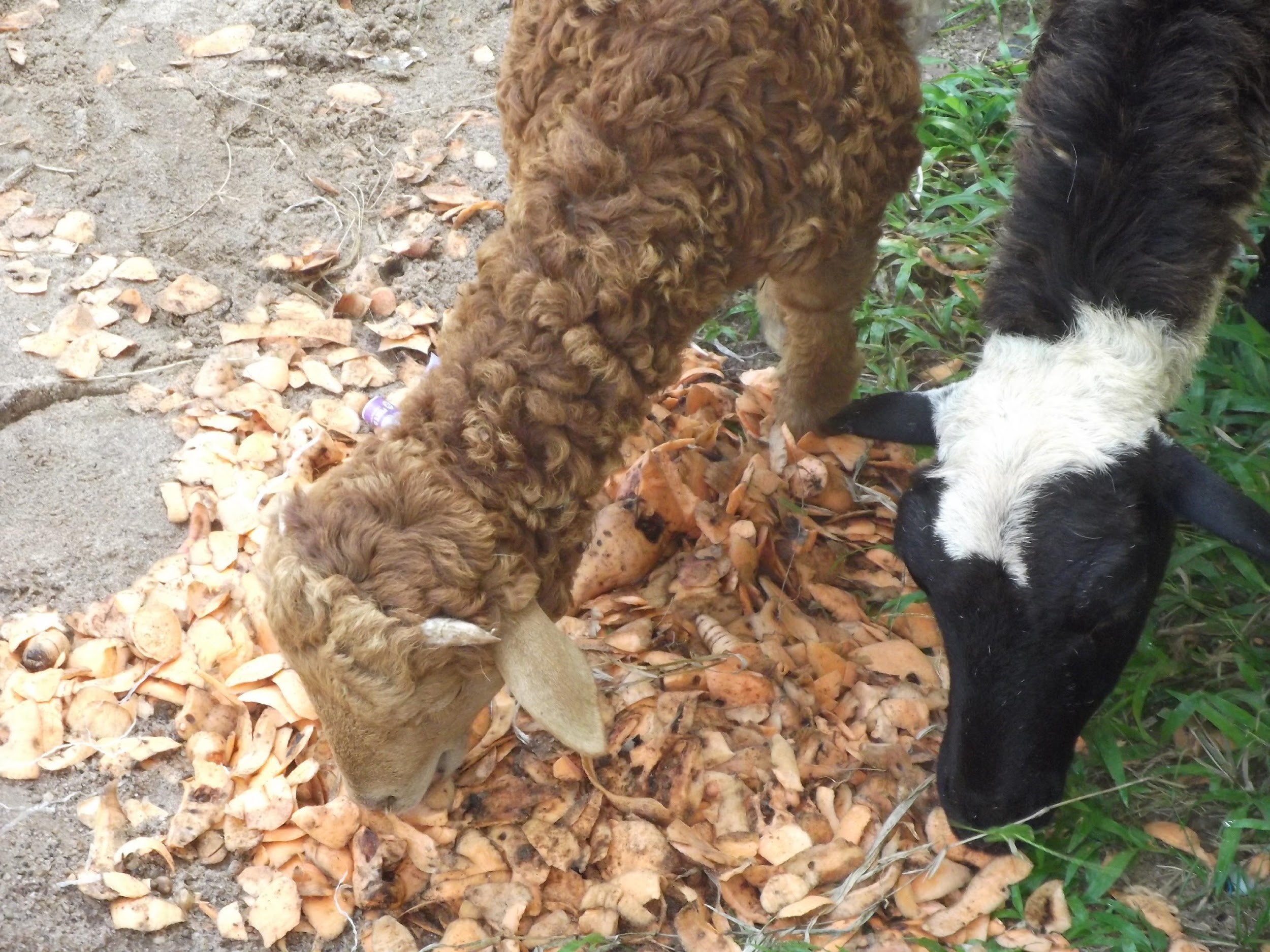Inspired Idea Opens New Market Possibilities for Nigerian Farmers
By Dr. Justus Lotade Manje
Sometimes you find inspiration in the most unlikely of places. For me it was overlooking James Olayiwola Mutiu’s fish farm in Osun State, Nigeria. James signed up to be one of the Orange Fleshed Sweet Potato (OFSP) decentralized vine multipliers for the Jumpstarting OFSP three-year proof of concept project that spans Nigeria, Ghana, and Burkina Faso. Farmers like him are instrumental in helping to make OFSP vines readily available on the open market and helping to prove to other farmers and businesses that OFSP is a viable crop that can create a steady and healthy source of income.
James is a humble man. Soft-spoken and so unassuming that when I first met him I thought he was a hired hand and not the owner of his farm. He loves the land he works and is especially passionate about raising animals: fish, goats, and sheep. When I heard that one of the Jumpstarting farmers was using OFSP as animal feed I thought it was a joke and set out to visit the man everyone was talking about.
As a vine multiplier James was slated to sell OFSP vines to root producers for the schools in the surrounding areas. A hiccup early in the project, however, delayed this market linkage. Rather than grow concerned about what to do with his harvest he decided to test the crop touted for his health benefits as a source of animal feed.
He already had a pellet-making machine and produced fish food by going to restaurants to collect waste such as rinds and noodles, which he would dry and process. When he swapped the scraps for OFSP the results were remarkable. According to him the rate of stunting and mortality amongst his fish went down and they grew in size. He says that the rate of fish loss fell below 5 % and stunting fell from 10 to 5%. Seeing the success with his fish he decided to feed OFSP to his goats and sheep.
Lustrous Pelts of OFSP-fed Livestock Help Make Sale

Without doing any tests, I asked James how he knew that OFSP was benefitting his animals. He explained to me that Nigerian farmers know how healthy an animal is by feeling and observing its hair. He’d noticed that his animals were shedding less hair and had shinier pelts since starting their new diets, but wasn’t sure how they’d fare on the open market. When the feasts of Ramadan rolled around his animals sold quickly. People would look at them and say, “Look at the hair on that animal,” and then would grab its waist to check for fat and would give good comments on the health. Their reactions helped him command higher prices and he was able to earn more than he had previously.
At Jumpstarting OFSP we are always looking for new ways to make this crop more attractive to farmers. Feed for livestock is not an area we ever considered exploring, and yet it has so many benefits for the farmer, the animals, and the growth of OFSP in Nigeria. James finds numerous reasons why OFSP makes for the perfect animal feed: it’s cheap and saves him time and money searching for animal food; the roots are easily stored making it accessible year round; since he plants and stores the roots himself he can control the quality of his animal feed; and his animals love it.
Weevil Infestation? No Problem. With OFSP Nothing Wasted

In Nigeria our people are resourceful. They are always looking for a way to make a profit. When you talk to a Nigerian farmer they are analyzing everything you say in terms of money and what can they get from participating. You have to be able to answer the questions, especially the tough ones like what happens when they face an insect infestation. With OFSP, weevils in the roots are often a problem. Now with this option of using OFSP for animal feed, I can tell them, “OFSP is a crop were nothing is wasted. If you get weevils in the roots you can still dry them and feed your animals.” They like this because it means even if they can’t sell the roots on the open market as a food source, they can still dry the roots, chop them up and sell them as animal feed to make a profit.
Anecdotally we’re seeing that animals really love OFSP. I’ve been on farm visits where goats and cows will break into the gardens and farm to dig up the roots to eat. They are just like people chasing after their favorite food. They can’t get enough of it. The more that OFSP is grown, for whatever reason, the more likely that human consumption will also rise which will help us meet our goal of counteracting hidden hunger and vitamin A deficiency.
OFSP as Livestock Feed: Farmers Profit During Dry Season
Livestock in this part of Nigeria grazes in open pastures during the wet season and is fed food purchased at the market during the dry season. Most of our farmers make their profit on OFSP selling to schools for their feeding programs— this means that when schools are closed they no longer have that source of income. The dry season happens to coincide with school closures so that by using the spoiled roots to sell as animal feed, OFSP farmers can still make a profit.
James has been so pleased with his heartier healthier animals that he’s opted to not sell to the local schools. He tells me that he can make more money by feeding it to his animals and selling them for a profit. If he were to sell his harvest to the school then he’d have to invest in animal feed. Much of it is imported are brought in from other parts of Nigeria which makes it expensive. In his opinion it also doesn’t produce animals that are as healthy as what he gets from OFSP. He is now planning to increase his acreage from 7 to 10 acres in order to continue to grow his business. Other farmers in his area are taking notice and experiencing similar successes. Another farmer has even begun grinding fresh OFSP leaves and mixing it with water to create a vitamin packed juice to feed his chickens.
What I love about what I do is that when you work with farmers you are always learning. It is what keeps me awake and keeps me excited; you just never know which farmer is going to be the source of the next inspired idea.
Dr. Justus Lotade Manje has a PhD in agricultural economics. He is an International Potato Center regional monitoring and evaluation specialist in West Africa coordinating activities for the Jumpstarting OFSP project in Nigeria. He is based in Nigeria.
